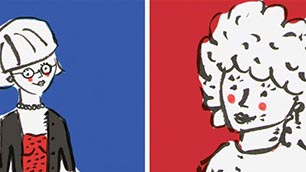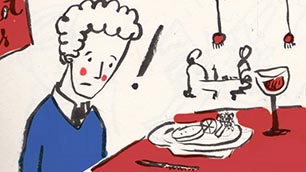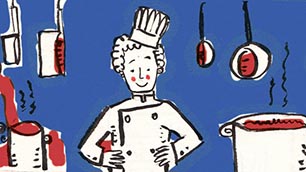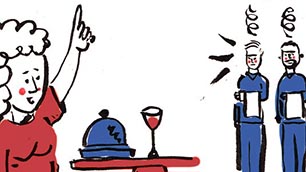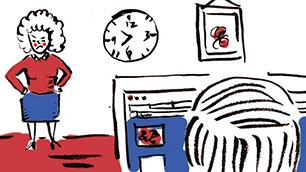UN and UNE
Forms
In French, all nouns have a gender, either masculine or feminine. It is very important to learn a noun's gender along with the noun itself because articles, adjectives, and some verbs have to agree with nouns. The gender of some nouns makes sense: homme (man) is masculine and femme (woman) is feminine. But others don't: personne (person) is always feminine, even if the person is a man!In French, few nouns can stand alone. Most need to be introduced or “determined” by an article. As in English, an article is either definite (the) or indefinite (a, an). In French, articles are also masculine or feminine and singular or plural.
Let’s talk about the indefinite singular articles in French: un and une
Masculine singular: un
| Jacques est un homme. Jacques est un étudiant. Elle étudie un livre. |
| Sabrina est une femme. Il mange une salade. Je vois une voiture. |
TU and VOUS
The words tu and vous both mean you. In English, the word you can be used to address any person or number of people, whatever the age or social status of that person. In French, it’s a bit more complex.A common misconception is that tu is used for talking to children and vous for talking to adults. Another misconception is that tu is for friends and vous is for strangers. Unfortunately, it’s not that simple! Hence this whole paragraph on tu and vous!
So what can we make of this complex situation? Remember first that tu is always used to address a single person and someone in a similar social situation. So what does similar social situation mean? Well, all sorts of things... I've deliberately chosen a vague term.
Here are a few clues to help you determine when to use tu:
|
And now a few clues for vous:
|
So the choice of tu or vous doesn’t have to do with age only. More generally, tu is often referred to as the familiar form, and vous as the formal or polite form.
PERSONAL PRONOUNS and ÊTRE
Personal Pronouns
Let’s first learn the personal pronouns. Personal pronouns are used only in conjunction with a verb.
| SINGULAR PERSONAL PRONOUNS (one subject only) | PLURAL PERSONAL PRONOUNS (more than one subject) |
| je ➝ I | nous ➝ we |
| tu ➝ you | vous ➝ you |
| il ➝ he | ils ➝ they (masculine subjects or a mixture of masculine and feminine subjects) |
| elle ➝ she | elles ➝ they (feminine subjects) |
Être
“Être” is an essential verb in French. It serves as a verb and an auxiliary.An auxiliary verb, or helping verb, is a conjugated verb used in front of another verb in compound tenses. There are two auxiliary verbs in French: “avoir” and “être”. We will learn about “avoir” in the next lesson.
Now, let’s conjugate “être” in the present. It is an irregular verb, so you’ll need to learn it by heart.
| SINGULAR PERSONAL PRONOUNS | PLURAL PERSONAL PRONOUNS |
| je suis ➝ I am | nous sommes ➝ we are |
| tu es ➝ you are | vous êtes ➝ you are |
| il est ➝ he is | ils sont ➝ they are |
| elle est ➝ she is | elles sont ➝ they are |
Examples:
| Je suis Marie. |
| Julien, tu es encore en retard. |
| Il est prêt. |
| Elle est triste. |
| Nous sommes dans la maison. |
| Julien et Marie, vous êtes très intelligents. |
| Ils sont portugais. |
| Elles sont anglaises. |





